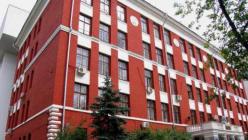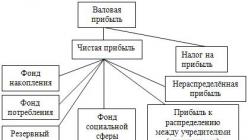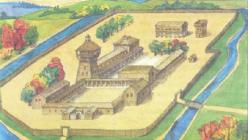Let's start from the very beginning. Initially, two groups were recruited for the direction - beginners (those who started learning German from scratch) and continuing ones. At the admissions office they promised that if you don’t know the language at all, there won’t be any problems, all teachers will take this into account and treat you leniently (later I’ll tell you about the surprise that awaited us in the 4th year). This was personally promised to me by the teacher who taught German in our 1st year, namely S****** T.A. When we came to see the first couple, we were informed that she had gone on vacation and would return to work at an unknown date. Accordingly, from the very beginning of training, we lost a large number of pairs, and those that were replaced were taught by another teacher from this department, who for some reason was very surprised to learn that we did not know German at all, although I repeat, they recruited two groups with different levels of knowledge. When, after about 2-3 weeks, T.A. finally went to work. Another “pleasant” surprise awaited us. Inspired, we went to her classes. BUT in the end, almost all we got in class were stories about cats in church, her husband and trips to Germany, which she organizes every year and feels great, missing another month of other classes. During the first semester we gained practically no knowledge; it was very scary to go to our first exam with an almost empty head. This exam was a mini hell that lasted 6 hours with almost hysterics, because when a teacher who didn’t give you anything threatens to give you a 3 in the first session, it’s not good for the nervous system. She taught us the German year, i.e., exactly the period of time when zero-year students should receive a good knowledge base, which we ultimately did not receive. Following her, we had another teacher who left the university two years later (E***** V.O.). Although she was strict and vindictive, she gave us at least some knowledge in the 2nd year. And then more, as they say. There's a new surprise in the 3rd year, and this department loves making them. The entire 3rd year we taught the main German, attention... GRADUATE STUDENT. Well, you yourself can guess what kind of year it was. I had to learn the language at home on my own. And in the 4th year, language practice is conducted by S***** V.A. A professor who oppresses you for your mistakes and does not take into account at all what kind of colleagues she has or what kind of background her students have. She has absolutely no individual approach and teaching ethics. Almost every lesson she repeated that in the 4th year we should already be able to speak as native speakers without errors, understand all dialects, that we are generally worthless and what kind of linguists we are. That is, it did not take into account at all that we started learning the language from scratch at a university, that during the learning process it is completely normal to make a certain number of mistakes, because even native speakers make them, and we are just learning. She simply asked a ton of questions, which we either checked two pairs in a row or didn’t have time to check. You answered your question and sit listening to your classmates answer for a hundred hours and spit at the ceiling, wasting time. Those. the quality of knowledge was lame, because It’s also impossible to assimilate and organize a huge amount of information in your head in a couple of days. The huge sheets with vocabulary that she assigned for each topic were forgotten within a week, because we did not practice this vocabulary. One got the impression that V.A. simply did not want to prepare for classes and therefore she was hammered all this time with a huge number of tasks. The main textbook was “Das Oberstufenbuch. Deutsch als Fremdsprache” by Anne Buscha, Gisela Linthout, which was more like a book for extracurricular reading and also with a lot of outdated vocabulary that the Germans had not even heard of. The head of the department E.V.B******* is a completely separate issue. The person is completely unqualified; during lectures she simply read out a textbook to us. The only good teacher in this department is L. F******. Native speaker and representative of DAAD. She taught us intercultural communication for a year and a half and she is the only person who gave us relevant and interesting information about Germany. But, unfortunately, someone at this department thought it was a great idea to remove her from our 4th year classes and put in B****** A.E., who, due to his busyness or laziness (it’s unclear), appeared throughout the semester 3-4 times and a few weeks before the exam, when I had to write a thesis, I sent a huge number of assignments that were added to the German assignment. And he was always a fan of skipping couples. Also, very loyal and kind Bogovskaya I.V. and English teacher M****** E.V., but she is from the Department of Translation Studies - English.
Back in the 1st year we had a wonderful Latin specialist K******. At that time we knew Latin better than German. For some reason, translation, history of language and regional studies in our 3-4th year were taught by one teacher, who is generally a historian, so he also didn’t give us much, although he sometimes told us interestingly, but haphazardly. We were not given any time to write our thesis. And it had to be submitted to the department in April.
As a result, I know practically nothing about the history of Germany and the history of the German language, no one gave us good pronunciation in phonetics either, I learned the language to a normal level thanks to independent studies. Of course, it is important to remember that learning a language is a lot of work. It’s not enough to just take all the classes, but even without good teachers and the quality foundation that a university should provide, little good can come of it. Why then go to university at all and study there for 4 years, when you can take good language courses, if the quality of education here is such a terrible one?
If we talk about the direction of the MCC in general, then there’s nothing particularly positive to say either. It’s very impractical, there are zero prospects and it’s unclear where to work next. It’s definitely better to go for translation or pedagogy.
The only advantage of MSPU IFL is its central location, modern building and proximity to the metro. As for the rest, everything here is like they say about people - don’t trust the shell, because the “filling” here is complete Scheisse.
|
|
The university has excellent reviews about the work and quality of education. The university is quite young (established in 1995, the founder is the Department of Education of the capital), its activities are carried out in accordance with the legislation, legal and regulatory acts of the Russian Federation and in particular the city of Moscow.
Moscow education
The university is headed by honorary worker of public education I.M. Remorenko, and the president is professor, academician of the Russian Academy of Natural Sciences V.V. Ryabov. Over the two decades of its existence, MSPU has received very positive reviews, since it has formed as a powerful scientific and educational complex, firmly fitting into the sphere of education, culture and social realities of Moscow, which allowed it to enter the top three pedagogical universities in Russia.
MSPU (Moscow City Pedagogical University) trains not only future teachers, but also specialists in other professions: civil servants, lawyers, designers, managers, sociologists, psychologists, and so on. Thus, it has organically integrated into the capital’s education system, focusing on the training of personnel that Moscow needs - mainly in the social sphere, in which graduates of Moscow State Pedagogical University find employment. Reviews of their work are very positive, because the quality of Moscow education speaks for itself.

Structure
MSPU implements more than three hundred educational programs, covering all levels and stages of general, secondary and higher professional, as well as additional education. The university has postgraduate, master's and bachelor's degrees. The structure of the university includes one faculty - pedagogy, twelve institutes, a comprehensive university school, thirteen colleges and a branch in Samara. At one time, eighteen thousand students and three hundred schoolchildren are studying at MSPU, reviews of which are almost always constructive. The vast majority of them are Muscovites.
The university has a development concept, which can be found in detail on the MSPU website. for the coming academic year you can find out there. The minimum score, for example, for a bachelor's degree at the Institute of Foreign Languages, which is part of the university, is very different from the minimum score for social studies at the Institute of Psychology and Pedagogy, and there are also a lot of nuances in the calculations. The passing score for the master's program at Moscow State Pedagogical University in 2016 is fifty units.

Teachers
The scientific and pedagogical potential of MSPU is very impressive: eighty-four percent of the teaching staff have academic degrees, twenty-six percent of this number have doctors of science. Present among the teachers are full members and corresponding members of academies of sciences, many honored teachers of the Russian Federation, laureates of State Prizes, as well as awards of the President and Government of the Russian Federation.
The university employs authors of textbooks for schools, colleges and universities certified by the Ministry of Education and Science of the Russian Federation. The quality of teaching is also improved due to the fact that MSPU actively attracts foreign colleagues to work - lectures are given by professors from Italy, China, Japan and neighboring countries.

Material base
The material and technical equipment of the Moscow State Pedagogical University base, the reviews of which are very eloquent from students, also allows us to maintain the quality of education at a high level. Both the branch, schools, colleges, and all institutes of the university have modern equipment - computer and multimedia classes, language laboratories, automated workstations.
The library stores more than a million books, its electronic catalog contains more than three hundred thousand descriptions, electronic resources, articles and periodicals, it is also equipped with multimedia and computer equipment. Access to the Internet at MSPU is not limited; you can use any library in the world.

Graduates
University pride - absolute winners and finalists of the Moscow competitions "Teacher of the Year" and "Teacher of the Year", graduates of Moscow State Pedagogical University. The faculties that trained such specialists are very different. There are also winners of All-Russian competitions. Student research is actively developing at the university; leading scientists of the university consider their students to be full members of creative research teams.
Here, applied research introduced into the activities of municipal educational institutions is of great importance, and the main city and university innovation platforms are created mainly on the basis of Moscow State Pedagogical University. Almost all faculties are involved in modern innovations, and as a result, the university became a laureate of the Moscow Government Prize for testing and introducing innovations into the programs of general education institutions. And not only this award was deservedly received by the Moscow City Pedagogical University.

Dormitory
The building, where rooms are provided primarily to Russian citizens and benefit recipients from among the students of Moscow State Pedagogical University, was provided by the Moscow Government. There are not very many places, there is always a queue to check in. However, there is a university hotel. Regardless of the form of study (contract or budget) and the size of the room (there are triple and double rooms), students must pay seven thousand per month for accommodation. This is not so much, considering the opportunity to study at Moscow State Pedagogical University.

Cost of education
Those admitted on a contractual basis have to pay annually for the acquired knowledge. Tuition fees vary greatly and depend on the chosen specialization. Only in colleges at Moscow State Pedagogical University the payment is fixed and since 2016 it has been one hundred and twenty thousand rubles.
Moscow City Pedagogical University- Moscow, 2nd Selskokhozyaystvenny proezd, 4. Psychology, preschool pedagogy and psychology, pedagogy and methods of primary education, deaf pedagogy, oligophrenopedagogy, speech therapy, special psychology. (Bim Bad B.M.... ... Pedagogical terminological dictionary
- (MGIU) Year of foundation 1960 Rector Valery Ivanovich Koshkin ... Wikipedia
This article or section needs revision. Please improve the article in accordance with the rules for writing articles... Wikipedia
FSBEI HPE "Moscow State University of Civil Engineering" (national research university) (FSBEI HPE "MGSU" (National Research University)) ... Wikipedia
AOCH VPO Moscow Financial and Legal University MFUA (MFUA) Motto Quality of education Quality of work Quality of life! ... Wikipedia
Moscow Pedagogical State University (MPGU) Main building of MPGU (Malaya Pirogovskaya, 1), formerly the Auditorium ... Wikipedia
Moscow Pedagogical State University (MPGU) Main building of MPGU (Malaya Pirogovskaya, 1), formerly the Auditorium ... Wikipedia
Books
- Tutoring in an open educational space. Self-care and building an individual. arr. programs , . The collection includes materials from the X International Scientific and Practical Conference (XXII All-Russian Conference) 'Tutoring in an open educational space: 'self-care' and building...
- Tutoring in an open educational space. "Self-care" and building an individual arr. programs , . The collection includes materials from the X International Scientific and Practical Conference (XXII All-Russian Conference) “Tutoring in an open educational space: “self-care” and building…
- History of state control (supervision) in the field of education in Russia (XVIII - early XXI century). Reader. Volume 1. Imperial Russia, . The scientific and practical manual is devoted to the problems of state control (supervision) in Russia from the moment of its formation at the beginning of the 18th century to the present. The manual is intended for…



